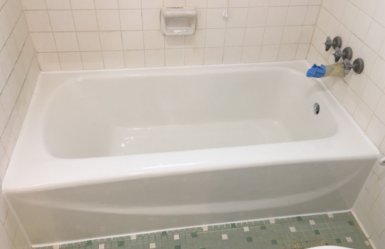
Tub Reglazing Vs. Tub Replacement Vs. Tub Casting
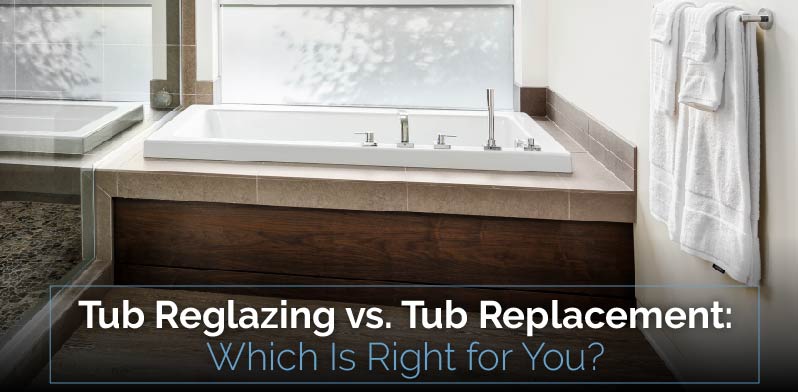
An unsightly bathtub can be the bane of any homeowner’s existence. A chipped, stained bathtub can weigh on your mood every day, as well as decrease the value of your home. It beckons your attention every time you enter your bathroom, but the process of replacing it can seem like a burden. The expenses that come with a new tub — such as installation fees, disposing of your old tub and more — cause many homeowners to drag their feet on addressing their old, worn-out bathtub.
And many of them are left wondering: “Do I have to replace my old tub?”
Luckily, replacement isn’t your only option. You actually have a few tub replacement options when it comes to revamping your unappealing bathtub. Yes, you can opt to replace it. You can purchase brand new bathtub for as little as $200- but that option comes with quite a few additional expenses. There’s also the appealing option of tub reglazing.
Choose which option is best for your situation, let’s review tub reglazing versus tub replacement.
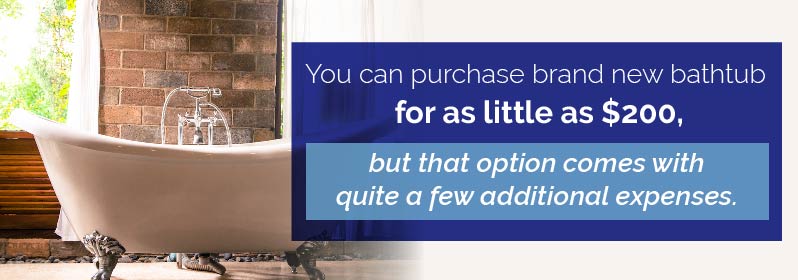
Let’s take a closer look at the tub replacement versus tub reglazing debate, so you can choose which option is best for your situation.
What’s Involved With a Bathtub Replacement?
Many hidden costs come with bathtub replacement. It’s wise to consider everything involved with a bathtub replacement before you decide what to do about your grimy old bathtub. Here are a few questions to consider:
- Can you physically remove the old bathtub yourself? If not, you’d likely have to hire a crew to remove it for you. Gauge the weight of your tub, and make sure you can safely remove it from your bathroom. Plastic tubs can weigh as little as 50 pounds, but the dimensions could pose a problem for removal, and cast iron tubs could weigh as much as 1,000 pounds.
- Will the old bathtub fit out of the bathroom door and another door to exit your home? It’s also important to measure your old tub and the new replacement tub, as well as the doors you’ll use to enter and exit your home. Oftentimes, an old tub will need to be cut into pieces for removal from your home.
- How will you dispose of your old bathtub? After you successfully remove your old bathtub from your home, you must properly dispose of it. Americans generate more than 50 million tons of construction and remodeling waste every year. Dumping your old tub in a landfill will add to that waste. You could look into donating it to a good cause, such as Habitat for Humanity, or try to repurpose it as a pond or cooler.
- How will you address the plumbing issues if your new tub’s plumbing doesn’t match the plumbing of your old tub? Tubs are usually suspended in two places by the existing plumbing. When you remove an old tub and bring in a new one, the plumbing fixtures may need to be replaced or adjusted to fit the new model.
- Do you have a plan in place to repair damaged flooring or to replace missing flooring pieces after the new tub is installed? Most tubs are positioned in a corner or an alcove. They typically overlap with the flooring and wall finishes, so they create a watertight seal. When you remove the old tub, you will destroy some of the existing flooring — whether it’s tile, laminate, linoleum or vinyl.
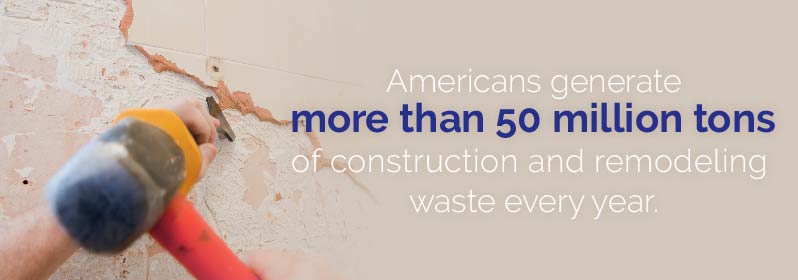
As you can see, purchasing a cheap $200 bathtub could end up costing hundreds or even thousands of dollars when you consider hiring a plumber and contractor and removing your old tub. If you’re planning a full bathroom remodel, you might be open to spending thousands of dollars to replace your old bathtub. But if you’re a cost-conscious homeowner looking for better solutions to address a worn-out bathtub, there are more economical options to consider.
Alternatives to Replacing a Tub
The best alternatives to a complete tub replacement are relining it or refinishing it, via the traditional methods or the new PureCoat process. All three of these options add years of life to an existing tub and come at only a fraction of the cost of a full tub replacement. Let’s take a closer look at these three options.
Option #1: Tub Relining
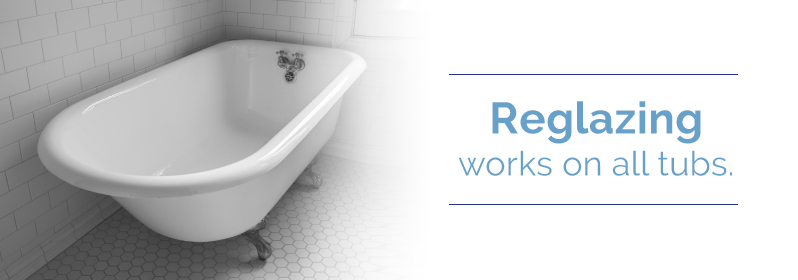
You can opt to reline your old bathtub with a tub liner, which is an insert made of molded acrylic. This option is only available for cast iron and steel tubs. It won’t work for your old acrylic tub.
If you decide to go this route, a professional will come to your home and measure your old bathtub and take photos. They will send this information to a manufacturing facility that will create your insert. In a few weeks, the insert will be delivered and installed.
Here are the advantages and disadvantages of opting for a tub relining:
- Advantages: You can enjoy a fresh look without the hassle and cost of a full tub replacement. You can also order a matching wall system with shelves and storage areas, which will add to the function of your tub. This is an excellent option if the walls surrounding your bathtub need a facelift as well. Liners are easy to clean and extremely durable, so you can use almost any type of cleaning agent without worrying about harming the liner.
- Disadvantages: Tub liners are a vanity approach to a worn-out bathtub. Liners cover up problems — they don’t provide a solution. If you have an existing moisture problem around your bathtub, a liner won’t fix the underlying problem. If you opt for a liner in this situation, you will seal the moisture issue under the acrylic liner, which would eventually cause further issues. You should take extra care to hire a trusted professional if you opt for a tub liner. Unless the installation is perfect, water could collect between your old tub and the new liner, resulting in mold and mildew.
You can expect to pay between $1,100 and $1,400 for a tub liner, and even more if you plan to install a wall unit with shelving as well.
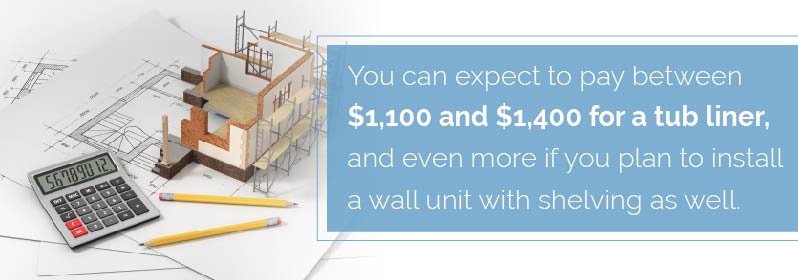
Option #2 Tub Refinishing

You can find DIY kits for refinishing your tub, but most professionals advise against this option. DIY tub refinishing requires you to apply a special chemical coating using a brush or roller, which can leave you with a painted, unprofessional finish instead of the refinished look you desire.
With a professional tub reglaze, an experienced technician will sand the old tub, completely removing the existing finishing. He or she will also fill in any cracks or chips, and apply a new coating with a sprayer. This is completed in several stages, and the result will be a fresh, glossy and smooth surface.
Here are some pros and cons of reglazing a bathtub:
- Pros: The cost of tub reglazing is lower than the cost of a full tub replacement or the cost of a new liner. The average cost is about $452, according to Angie’s List. A refinished bathtub can last for about 20 years if you care for it properly, which can be longer than the lifespan of a brand-new bathtub.
- Cons: Reglazed tubs require special care, so you should avoid using harsh chemicals to clean a newly surfaced unit. Use only mild, nonabrasive and non-bleach cleaning products. If you aren’t careful, the glossy finish of your reglazed tub could become dull over time, reducing the number of years you enjoy it.
Option #3 PureCoat Refinishing/ Tub Casting
This is a similar process to the traditional refinishing process, but with several important differences.
The primary and most noticeable difference is that this is a pour-on application, as opposed to the spray-on application of the traditional refinishing. This pour-on application means a complete lack of any of the environmentally harmful fumes you’d experience during the spraying process — and makes PureCoat the best option for odorless tub reglazing.
PureCoat is a luxury, top-of-the-line process that surpasses traditional refinishing or relining in terms of sheer longevity and efficiency. In this process, nothing needs to be removed or ripped out. Instead, an experienced technician removes all traces of the old finishing and then pours this new finish into place. PureCoat is self-leveling, just like a new tub, and is 5x thicker than a traditional spray application would be.
Here are the advantages and disadvantages of Pure Coat refinishing:
- Advantages: This is the last refinish your tub will ever need. PureCoat is extremely durable, and won’t chip or scratch. It’s also UV resistant, eco-friendly and completely odor free. It’s extremely flexible, making it great for fiberglass crack repair. It’s easy to clean and polish and comes with a 5-year warranty. It’s also a fast process, meaning you’ll have a basically new tub in less than 24 hours.
- Disadvantages: This is a top-of-the-line product, and the cost reflects that. However, this cost is easily offset by the tremendous benefits that come with PureCoat. Because this finish will outlast any other option, the price is well worth it. This is also a permanent option, meaning that you’ll want to make sure this is the choice for you.
Should I Replace My Bathtub?
If you’re still not sure whether you want to replace your worn-out bathtub or go with one of the alternatives to replacing a tub, consider the following four metrics:
- Cost. Like most homeowners, cost is probably a top concern when weighing the pros and cons of any remodeling project. You can purchase a new bathtub for a few hundred dollars or spend thousands on a top-quality bathtub.
If you opt for a total bathtub replacement, remember that the bulk of the cost will come from additional expenses besides the tub itself. Unless you remove the old tub yourself and install the new unit, you will have to hire someone to remove and dispose of your old tub, as well as install the new one. You might need to hire a plumber to adjust your plumbing fixtures to fit the new unit.

You may also need to hire a contractor to match the flooring in your bathroom and replace pieces or parts that were destroyed during the removal and installation process. If cost is the most important factor in your decision, you should opt to reglaze your bathtub. You will spend the least money and, if you care for it properly, it will last for decades. If cost is not as much of a concern, PureCoat will undoubtedly be your best option for refinishing your tub.
- Time. Reglazing a bathtub and replacing your entire bathtub will actually take about the same amount of time — usually no more than three days. There is much more labor involved in a replacement, but there are many stages involved in a reglaze, too. However, if you run into plumbing or installation issues during a full tub replacement, it could take longer.
With a typical reglaze, there’s a waiting period between each stage of the reglazing process. With a replacement, you should expect your bathroom to be out of commission for a few days. With a reglaze, you can use your bathroom — minus the tub — while it’s being resurfaced. If you opt for a new tub liner, it won’t take long to install, but it will take a few weeks to order and receive the new, customized liner.
If you’re opting for PureCoat, this is one of the fastest options. The pour-on application is very quick and should be complete in about 24 hours.
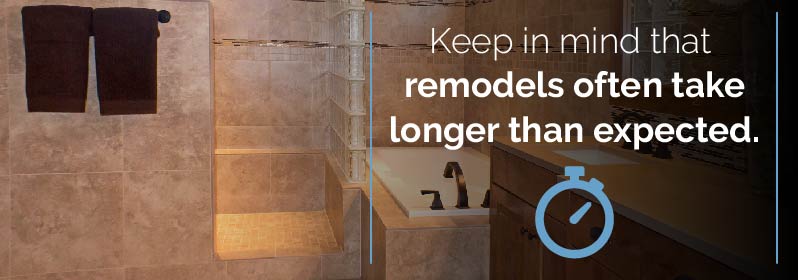
Keep in mind that remodels often take longer than expected. If a problem arises during a tub replacement, it can easily set you back by a few days — or even longer.
- Labor. If you opt to reglaze your own tub, which we strongly advise against, you can expect to spend many grueling hours on the task. If you opt to replace your own bathtub, it will also be a long and tiresome experience. You might need to rent tools to demolish your old tub, or enlist the help of friends to help you carry and dispose of the old tub.
If you hire a professional to reglaze your tub, they will spend time cleaning and sanding your old tub. Then, they will apply layers of glaze and then a finish. It will need to dry between layers. If you hire a professional to remove your old tub and install the new one, more labor will be involved to address necessary plumbing, sealing and flooring issues. The process is simpler with PureCoat, where a professional will simply need to pour this into place. There is minimal labor involved with installing a tub liner, as well.
- Quality. Many new bathtubs on the market, especially the cheaper options, aren’t of high quality. If you have an older yet well-made bathtub, a quality reglazing with PureCoat will leave you with a beautiful, long-lasting, finished product that’s better than a cheap, but brand-new, tub.
Also, it’s important to remember that not all bathtub refinishing options are the same. Be sure to ask about the quality when you’re hiring a professional to reglaze your tub. Companies use different types of coatings and substances for adhesion. Some involve acid and some are acid-free.
The final step in a reglaze — the polishing — will also differ depending on the company you hire. Some companies don’t do high-gloss polishing. If you’re seeking a high-shine option, hire a company that can accommodate your wishes.
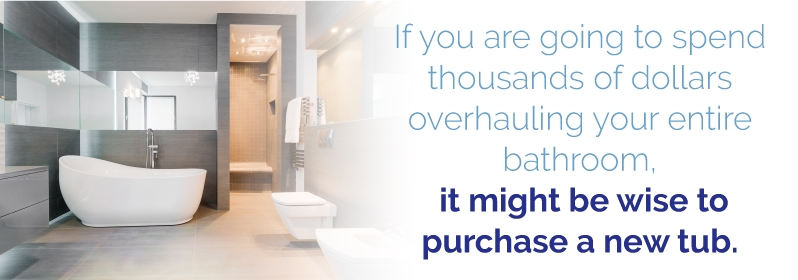
When deciding to reglaze or replace your worn-out bathtub, you have many things to consider. If you want to spend thousands of dollars and completely overhaul your entire bathroom, it might be wise to purchase a brand-new tub. If you’re also planning to replace the floor and the plumbing, it may be worthwhile to replace the bathtub during the process.
However, if you’re looking for a cost-effective solution to address a worn-out bathtub, a reglaze is a wise investment. It will increase the value of your home and provide you with a long-lasting bathtub, perfectly customized to your existing plumbing and bathroom décor.
Reglazing and Refinishing Your Tub With PureCoat Could Be the Best Choice
When trying to decide what your best option is, there’s a lot to consider. The only way to decide is to understand what you’re looking for. Any of these options will provide you with an updated tub, but only by taking all of them into consideration can you decide which option will provide the solution that’s best for you.
If you’re going to be renovating your entire bathroom, top to bottom, you might be best off getting an entirely new tub. If you’re looking for the most cost-effective solution, you might consider re-glazing. If you don’t want a new tub, but you want something that will be long lasting, eco-friendly, fast and completely odorless, the best option is the PureCoat casting.
The experts at Custom Tub & Tile agree that PureCoat is among your best solutions for a worn-out bathtub. When you work with a trusted professional with high standards for quality, your old bathtub can be transformed from an eyesore to a brilliant centerpiece of your bathroom.
After being refinished with PureCoat, your durable, refinished bathtub will be ready to face years more of wear and tear and last through it all. If you want the option that will provide the most long lasting, dependable bathtub, then opt for the PureCoat. After as little as 24 hours, you’ll have almost an entirely new bathtub that boasts a lifespan of at least 20 years.
Contact Custom Tub & Tile

Learn what makes Custom Tub & Tile different from our competitors. We are dedicated to providing honest, worthwhile solutions to your resurfacing needs. Call us at (240) 668-4208 to talk to a knowledgeable representative, or view the many testimonials on our website to learn more about the Custom Tub & Tile difference.
We’re happy to provide you with a free quote and answer any questions you have about bringing new life to your living space.
We’re Ready When You Are!
We invite you to look around our site and learn more about our services, pricing and options. If you want to talk to any of us about the work we do, we’d be more than happy to hear from you, so give us a call at 240-668-4208 anytime!


